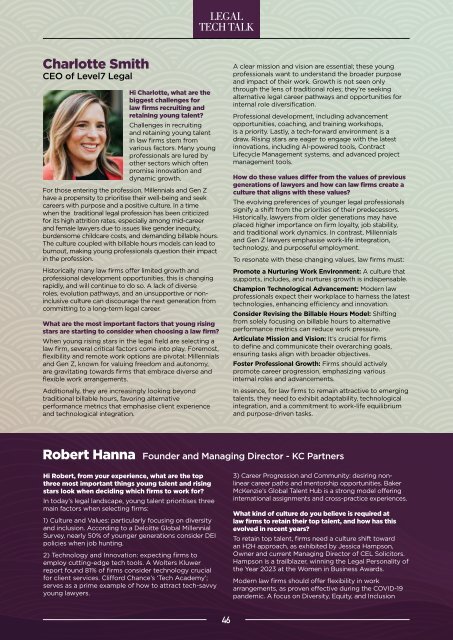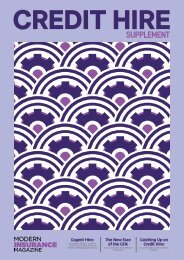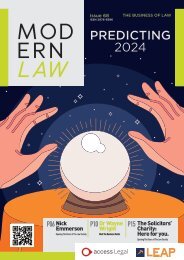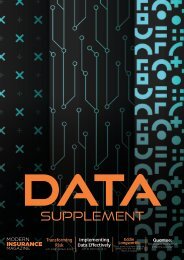Modern Law Magazine Issue 66
Create successful ePaper yourself
Turn your PDF publications into a flip-book with our unique Google optimized e-Paper software.
LEGAL<br />
TECH TALK<br />
LEGAL<br />
TECH TALK<br />
Charlotte Smith<br />
CEO of Level7 Legal<br />
Hi Charlotte, what are the<br />
biggest challenges for<br />
law firms recruiting and<br />
retaining young talent?<br />
Challenges in recruiting<br />
and retaining young talent<br />
in law firms stem from<br />
various factors. Many young<br />
professionals are lured by<br />
other sectors which often<br />
promise innovation and<br />
dynamic growth.<br />
For those entering the profession, Millennials and Gen Z<br />
have a propensity to prioritise their well-being and seek<br />
careers with purpose and a positive culture. In a time<br />
when the traditional legal profession has been criticized<br />
for its high attrition rates, especially among mid-career<br />
and female lawyers due to issues like gender inequity,<br />
burdensome childcare costs, and demanding billable hours.<br />
The culture coupled with billable hours models can lead to<br />
burnout, making young professionals question their impact<br />
in the profession.<br />
Historically many law firms offer limited growth and<br />
professional development opportunities, this is changing<br />
rapidly, and will continue to do so. A lack of diverse<br />
roles, evolution pathways, and an unsupportive or noninclusive<br />
culture can discourage the next generation from<br />
committing to a long-term legal career.<br />
What are the most important factors that young rising<br />
stars are starting to consider when choosing a law firm?<br />
When young rising stars in the legal field are selecting a<br />
law firm, several critical factors come into play. Foremost,<br />
flexibility and remote work options are pivotal; Millennials<br />
and Gen Z, known for valuing freedom and autonomy,<br />
are gravitating towards firms that embrace diverse and<br />
flexible work arrangements.<br />
Additionally, they are increasingly looking beyond<br />
traditional billable hours, favoring alternative<br />
performance metrics that emphasise client experience<br />
and technological integration.<br />
A clear mission and vision are essential; these young<br />
professionals want to understand the broader purpose<br />
and impact of their work. Growth is not seen only<br />
through the lens of traditional roles; they’re seeking<br />
alternative legal career pathways and opportunities for<br />
internal role diversification.<br />
Professional development, including advancement<br />
opportunities, coaching, and training workshops,<br />
is a priority. Lastly, a tech-forward environment is a<br />
draw. Rising stars are eager to engage with the latest<br />
innovations, including AI-powered tools, Contract<br />
Lifecycle Management systems, and advanced project<br />
management tools.<br />
How do these values differ from the values of previous<br />
generations of lawyers and how can law firms create a<br />
culture that aligns with these values?<br />
The evolving preferences of younger legal professionals<br />
signify a shift from the priorities of their predecessors.<br />
Historically, lawyers from older generations may have<br />
placed higher importance on firm loyalty, job stability,<br />
and traditional work dynamics. In contrast, Millennials<br />
and Gen Z lawyers emphasise work-life integration,<br />
technology, and purposeful employment.<br />
To resonate with these changing values, law firms must:<br />
Promote a Nurturing Work Environment: A culture that<br />
supports, includes, and nurtures growth is indispensable.<br />
Champion Technological Advancement: <strong>Modern</strong> law<br />
professionals expect their workplace to harness the latest<br />
technologies, enhancing efficiency and innovation.<br />
Consider Revising the Billable Hours Model: Shifting<br />
from solely focusing on billable hours to alternative<br />
performance metrics can reduce work pressure.<br />
Articulate Mission and Vision: It’s crucial for firms<br />
to define and communicate their overarching goals,<br />
ensuring tasks align with broader objectives.<br />
Foster Professional Growth: Firms should actively<br />
promote career progression, emphasizing various<br />
internal roles and advancements.<br />
In essence, for law firms to remain attractive to emerging<br />
talents, they need to exhibit adaptability, technological<br />
integration, and a commitment to work-life equilibrium<br />
and purpose-driven tasks.<br />
Emma Bower<br />
Head of Community - Heriot Brown<br />
From your experience, what<br />
are the values that are most<br />
important to young people<br />
in the legal profession?<br />
Younger lawyers are looking<br />
for fulfilment in their career<br />
and are more likely to pass<br />
on an opportunity if it<br />
doesn’t meet all, or at least<br />
most, of the values that will<br />
provide that.<br />
Work-life balance, traditionally a challenge in the<br />
demanding realm of law, is now non-negotiable for many<br />
young lawyers. Those who began their careers in the<br />
pandemic era, have grown accustomed to flexible working<br />
arrangements. It should be no surprise that they may<br />
resist the idea of returning to a predominantly officebased<br />
culture, which doesn’t align with their preferences<br />
for flexibility. I urge them to be cautious that they do not<br />
miss out on the natural mentorship that occurs when in<br />
the office, surrounded by experienced lawyers and peers.<br />
They are looking for “meaningful employment” where<br />
their personal values align with the company’s. When<br />
evaluating potential employers, young lawyers scrutinize<br />
various factors, enquiring about their commitment to<br />
ESG strategies, DEI metrics, the flexibility of hybrid or<br />
remote working policies. They also want to ensure that<br />
the company demonstrates a dedication to investing in<br />
their ongoing training and career development.<br />
How do these values differ from the values of previous<br />
generations of lawyers?<br />
I don’t believe that the values held by young lawyers<br />
entering the legal profession today significantly<br />
differ from those of seasoned lawyers in previous<br />
generations. They also care about DEI, the<br />
environment, pro bono, making the world a better<br />
place and having a work-life balance.<br />
Perhaps the perceived difference in values within the<br />
generations doesn’t stem from a difference in values, but<br />
from a difference in circumstance?<br />
Historically, there was often little room for negotiation<br />
when it came to working hours and certainly no option<br />
to work from home as a junior. Young lawyers were<br />
expected to meet demanding work schedules with little,<br />
to no flexibility. The prevailing ethos was akin to a “do<br />
it or die” situation, where the pressure to deliver was<br />
exceptionally high.<br />
Previous generations do acknowledge a shift though and<br />
managing GenZ has come up in several GC Community<br />
Chats recently with some wanting advice on how to be<br />
sensitive to their values and way of working.<br />
Finally, what do young people think the future of work<br />
will look like for lawyers?<br />
I’ve seen more GCs incorporating the ESG strategy into<br />
the legal one and can be a great opportunity to enhance<br />
the knowledge, abilities and exposure of the lawyers.<br />
With the in-house career often fighting against fairly<br />
flat structures, the diversity of ESG matters can offer a<br />
scope for everyone to own one or more issues and offer<br />
a development opportunity that can be inspiring to the<br />
team dynamic.<br />
The rise of legal operations and AI should be embraced<br />
to take over mundane tasks and free up lawyers for more<br />
interesting tasks. It’s exciting to hear from GCs about<br />
their use of AI, chat bots and other really cool tools that<br />
mean they aren’t bogged down with the day to day.<br />
Initiatives like “Being Human” and “O Shaped <strong>Law</strong>yer”<br />
are important allies as they support the teaching and<br />
prioritising of human skills alongside legal expertise.<br />
As the legal profession evolves, interpersonal skills,<br />
empathy, and adaptability become increasingly valuable.<br />
For young individuals aspiring to enter the legal<br />
profession or those already on their legal journey, my<br />
advice is simple: don’t wait until you need a network<br />
to start building one. Networking is a powerful tool for<br />
personal and professional growth, and it can provide<br />
valuable insights into the diverse opportunities available<br />
within the legal field. And I can attest that the in-house<br />
community is here to help where they can!<br />
Robert Hanna Founder and Managing Director - KC Partners<br />
Hi Robert, from your experience, what are the top<br />
three most important things young talent and rising<br />
stars look when deciding which firms to work for?<br />
In today’s legal landscape, young talent prioritises three<br />
main factors when selecting firms:<br />
1) Culture and Values: particularly focusing on diversity<br />
and inclusion. According to a Deloitte Global Millennial<br />
Survey, nearly 50% of younger generations consider DEI<br />
policies when job hunting.<br />
2) Technology and Innovation: expecting firms to<br />
employ cutting-edge tech tools. A Wolters Kluwer<br />
report found 81% of firms consider technology crucial<br />
for client services. Clifford Chance’s ‘Tech Academy’;<br />
serves as a prime example of how to attract tech-savvy<br />
young lawyers.<br />
3) Career Progression and Community: desiring nonlinear<br />
career paths and mentorship opportunities. Baker<br />
McKenzie’s Global Talent Hub is a strong model offering<br />
international assignments and cross-practice experiences.<br />
What kind of culture do you believe is required at<br />
law firms to retain their top talent, and how has this<br />
evolved in recent years?<br />
To retain top talent, firms need a culture shift toward<br />
an H2H approach, as exhibited by Jessica Hampson,<br />
Owner and current Managing Director of CEL Solicitors.<br />
Hampson is a trailblazer, winning the Legal Personality of<br />
the Year 2023 at the Women in Business Awards.<br />
<strong>Modern</strong> law firms should offer flexibility in work<br />
arrangements, as proven effective during the COVID-19<br />
pandemic. A focus on Diversity, Equity, and Inclusion<br />
(DEI) is also critical; 76% of professionals say a<br />
workplace’s DEI policy influences their job choice,<br />
according to a Glassdoor survey. The need for continuous<br />
learning and community involvement is also pressing,<br />
especially for young professionals who want their work<br />
to have a broader societal impact.<br />
What roles, for young grads, will be changing in the era<br />
of AI and tech evolution - what impact will this have on<br />
both employers and aspiring talent?<br />
With advancements in AI and technology, the role of<br />
young grads is evolving. Thomson Reuters and Clio reports<br />
indicate a trend of increasing tech adoption in legal<br />
practices. This makes multidimensional, tech-savvy talents<br />
like Ved Nathwani, Future Trainee Solicitor at Stephenson<br />
Harwood, and Vera Mayzel, Future Trainee Solicitor at<br />
Hogan Lovells, more valuable.<br />
Ved, co-founder of The<br />
Future Proof Project, focuses<br />
on integrating AI into legal<br />
careers and is changing<br />
employer expectations from<br />
traditional to tech-savvy<br />
skill sets. Vera, emphasising<br />
holistic legal education,<br />
makes the case for a blended<br />
workplace that values both<br />
traditional expertise and digital skills. The next generation,<br />
exemplified by these pioneers, demands a blend of<br />
traditional legal skills with digital competency, thus<br />
redefining what it means to be a legal professional in a<br />
digital age.<br />
46<br />
47
















